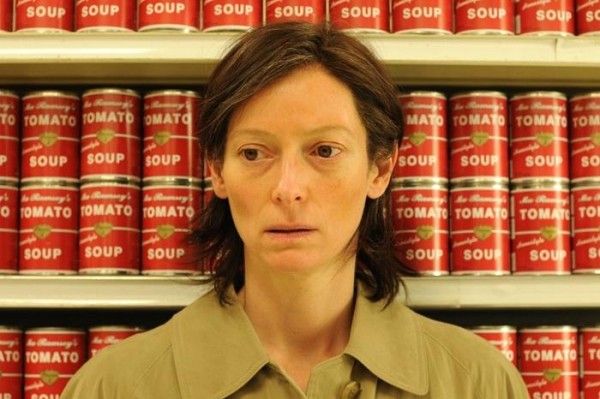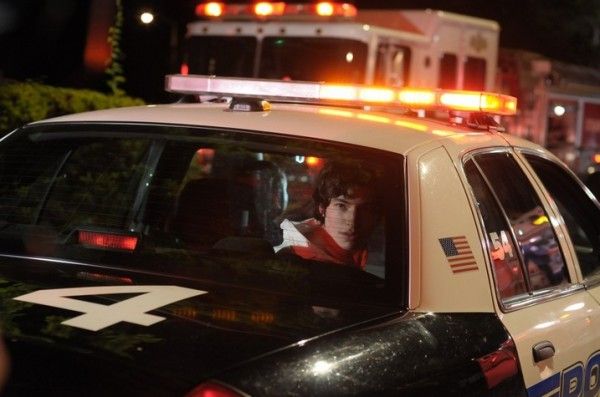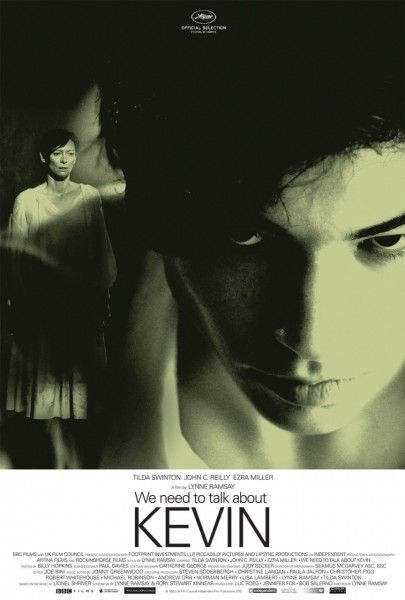There may be more star-studded films at this year’s Toronto Film Festival and certainly there will be more up-lifting movies, but I find it hard to believe that anything will screen that seers itself into your brain with the same intensity as We Need To Talk About Kevin. At times darkly funny, but for the most part just plain dark, the film stars the incomparable Tilda Swinton and John C. Reilly as the parents of a child responsible for an unspeakable crime. Told in a disjointed structure with almost painterly visuals from director Lynne Ramsay, this is a film to be savored. It’s a remarkable work about the deep scars parents and children leave on each other that will linger in the mind of anyone who sees it long after the credits roll whether they enjoy Ramsay’s unique vision or not. Hit the jump for more.
Tilda Swinton gives another on of her patented introspective performances as Eva, a woman who we learn early on survived some sort of tragedy perpetrated by her son. The act itself isn’t revealed until late in the running time, but from the beginning we see the results. Eva is unable to find a job, her house is splattered with red paint by vandals, and she can’t even visit the supermarket without having her eggs smashed by a grieving parent. Through Ramsay’s disjointed time structure we also simultaneously see the difficulties she faced raising Kevin. Bitter that motherhood cut short her life as a world traveler, Eva is resentful of the boy from a young age and he strikes back with a lifetime of cold stares and cruel pranks. Eva’s husband (John C. Reilly) and daughter Lucy (Ursula Parker) never quite see the darkness in Kevin. He saves that for his mother with painted smiles and faked emotions masking deep emotional turmoil whenever anyone else is near. The problems start when he is a misbehaving child, but continue through a violent adolescence. The cause is thankfully never spelled out in a needless scene of psychological explanation. It’s clear something is deeply wrong with this mother/child relationship and a time bomb has been waiting to go off since birth.
Without getting into specifics, it’s clear early on the a Columbine-esque massacre was the end result of Kevin’s inevitable collapse. Many films have been about this subject and the scars it leaves, but few have felt as compelling or frankly emotionally truthful as We Need To Talk About Kevin. There’s an element to which this story is a domestic horror film with an innately evil child a la The Bad Seed, but at the same time the story is told subjectively through Eva’s point of view and clearly her less than stellar mothering skills played a major role in the boy’s troubled outcome. Flashes of memory show a distressingly cold child (chilling played by Jasper Newell) grow into a teenage sociopath with a disturbed sense of humor (an extraordinary turn by Ezra Miller, portrayed with almost sadistic glee), and Eva really only shows concern about the boy when it’s too late. The film plays like the memories of a woman trying to make sense of her role in a tragedy and her inability to find any easy answers feels like a refreshingly realistic take on the subject matter.
The film is writer/director Lynne Ramsay’s first in 9 years and she’s been much missed. Her previous works Ratcatcher and Morvern Caller were almost Terrence Mallick-like image collages more interested in presenting an audiovisual experience than anything approaching a narrative. Much of We Need To Talk About Kevin shares that abstract style, but for the first time it feels like Ramsay has a clear and coherent theme to explore through her experimentation. Ratcatcher and Morvern Caller are hauntingly lyrical movies well worth experiencing, but Ramsay slowly dials down her disjointed structure as the film goes along and builds to a deeply disturbing emotional and thematic climax lacking in her previous films. The end result is emotionally devastating in a manner that will inevitably put off some viewers, but will leave a deep mark on those in tune with Ramsay’s cracked vision. It certainly doesn’t hurt that her film features a score from Radiohead’s Johnny Greenwood (who previously scored There Will Be Blood) that is as esoteric and moving as anything on screen. On a purely aesthetic level the film is mesmerizing. Throw in the dark and resonant themes and you’ve got yourself a mini-masterpiece.
The only question that lingers with We Need To Talk About Kevin is how it will be perceived. Certainly the performances across the board are far too strong to ignore, but with subject matter this touchy told in such an appropriately morally ambiguous style, it’s difficult to predict how people will respond. The film will be respected critically by many, but I worry that Ramsay’s refusal to spell out her moral beliefs as a filmmaker or fully demonize her characters will be viewed as too cold and calculated by many. If that’s the case and the film is ignored, it will be a real shame. However, no true art can be made without risking it will be misunderstood and hopefully this film will be discovered by the audience it deserves. That may take longer than the inevitably brief art house release will allow, but it will happen. This film is simply too good for obscurity. –Phil Brown
--- A




